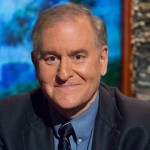Fifty years ago, on March 7, 1965, civil rights activists, demonstrating for voting rights, were savagely attacked by Alabama state troopers and vigilantes as they tried to cross the Edmund Pettus Bridge. That day became known as “Bloody Sunday.”
That night, ABC News interrupted the network’s Sunday night movie, Judgment at Nuremberg, the Academy Award-winning film about the trials of Nazi war criminals, to show the nation what had happened. The raw footage had no narration and ran for 15 minutes. Viewers, estimated at 48 million, were stunned by the sight of peaceful demonstrators being beaten and tear-gassed. Others who saw news photos of the tragedy had similar reactions — horror, shame and an overwhelming desire to do something. Thousands headed for Selma. Those who could not go south demonstrated in their own communities, from Maine to Hawaii.

Alabama State troopers attack civil-rights demonstrators outside Selma (Photo: FBI/ Wikipedia)
Washington was besieged by demonstrators calling for a voting rights act. They obstructed traffic and paraded night and day near the White House, their chanting and singing interrupting the sleep of President Lyndon Johnson and the First Family. Johnson was sympathetic to their demands — in secret, a voting rights bill was being drafted — but he hesitated to announce it because he just had signed the Civil Rights Act of 1964 the previous July, and believed that Congress was not yet ready to pass another major civil rights law.
Bloody Sunday changed everything. Clergymen, congressmen and senators harassed the president, everyone demanding an answer to the same question: “Why has it taken so long for you to send a voting rights bill to the Congress?”
“Two reasons,” Johnson replied. “First, it’s got to pass. We can’t risk defeat or dilution by filibuster on this one. This bill has to go up there clean, simple and powerful. Second, we don’t want this bill declared unconstitutional. This can’t be just a two line bill. The wherefores and the therefores are insurance against that.”
But now, the pressure became too great. The president decided that he must quickly send a bill to Congress. But first he should address the American people in a speech before a joint session of the House and Senate. Nobody knew it then, but it would turn out be the greatest speech of his presidency, one that still resonates 50 years later: history’s finest presidential address on race in the United States.
Although events in Alabama — the jailing of hundreds of African-Americans as they protested the denial of voting rights, the beating of teenage demonstrators — all of which already had occurred before Bloody Sunday — would seem to demand a presidential address, there was nothing inevitable about this one. Traditionally, a president did not personally introduce legislation to the Congress: The last time that it occurred was in 1946 when Harry Truman came to Capitol Hill to ask permission to draft striking railroad workers into the armed forces to end their paralyzing strike. So precedent was against Johnson. In a meeting with congressional leaders on March 14, Senate Majority Leader Mike Mansfield and Minority Leader Everett Dirksen, protectors of that body’s prerogatives, told Johnson that he should not appear. Dirksen feared that Johnson would look like he had been forced by black protestors into submitting the legislation, and Congress would no doubt resent such public pressure. A written statement would suffice.
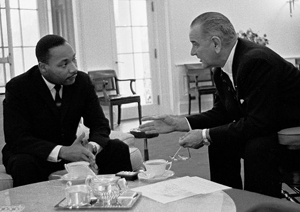
President Lyndon B. Johnson and Martin Luther King Jr. work on voting rights legislation. (Photo: Yoichi R. Okamoto/ Wikipedia)
John McCormack, Speaker of the House, disagreed. At 73, he was the oldest man in the room and his colleagues greatly respected him. The president should present the bill in person, McCormack insisted. House Majority Leader Carl Albert agreed: “I don’t think your coming before the Congress would be a sign of panic. I think it would help.” This was Johnson’s view too, although the president knew that he lacked the rhetorical skills of his hero FDR and predecessor, JFK. By 6:30 p.m. a consensus had formed: Johnson would speak to a joint session of Congress and the nation from the House chamber at 9 p.m. the following night.
Little time remained to produce the most important speech of Lyndon Johnson’s career. A Justice Department lawyer had been working on a draft for weeks, but a few days before, Attorney General Nicholas Katzenbach had told the president, “It just doesn’t sing yet,” Johnson’s aide Horace Busby, a Texan and longtime friend of the president, was given the assignment of revising the lawyer’s draft rather than Johnson’s favorite speech writer, 33-year-old Richard Goodwin. When Johnson heard the news the next morning, he was enraged. “Don’t you know a liberal Jew has his hands on the pulsebeat of America, and you asked a Texas public relations man?” He told his aide Jack Valenti, “Get Dick to do it. And now!”
Valenti hurried to Goodwin’s office early on the morning of March 15, only to learn that the young speechwriter rarely showed up for work before 9:30 a.m. He waited nervously until Goodwin arrived, startling him with the news that he was to write that evening’s speech on voting rights. Goodwin was tired. He had spent the last evening drinking and dining with friends and, because the White House hadn’t notified him, he thought the job had gone to someone else. “[The President] needs a speech from you …right away,” Goodwin later recalled Valenti saying, “Get to work.” Valenti then left Goodwin to his task, which had to be completed by mid-afternoon so that the text could be loaded into the presidential teleprompter.
Goodwin relished the job. “It was great working for Johnson,” he later reflected. “I had come to know his pattern of expression, patterns of reasoning, the natural cadences of his speech.” Goodwin also knew that Johnson preferred “forceful, eloquent, straightforward” speeches, and that’s what Goodwin would deliver.
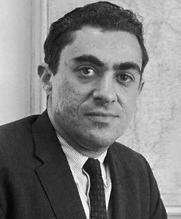
LBJ speechwriter Dick Goodwin (Photo: LBJ Presidential Library/ Wikipedia)
In some ways, Goodwin’s past was not very different from Johnson’s. As boys both had experienced near poverty — Johnson in the Texas Hill country, Goodwin in Boston and then in rural Maryland, where his father landed a wartime job. Johnson’s modest education and southern roots had left him with a sense of inferiority that no political achievement could wipe away, while Goodwin had experienced the taunts and blows of young anti-Semites. Those shared experiences were in the minds of both men as Goodwin worked on the speech.
As he stared at the blank page in his manual typewriter, Goodwin could see “images tumbling through my mind — black bodies on the Pettus Bridge, the fear of my youth and the horrified terror of men whose faces were contorted by bigotry — ‘kike,’ ‘nigger.’ By the purest chance, an accident of time and place, I had been given an opportunity to strike back. I could, that is, if my craft was equal to my passion.”
Goodwin worked tirelessly all morning and into the early afternoon. As he finished a page, it was immediately taken to the president, who left Goodwin alone except for one afternoon call. “You remember, Dick, that one of my first jobs after college was teaching young Mexican-Americans down in Cotulla,” Johnson told Goodwin. “I thought you might want to put in a reference to that.”
“Yes, Mr. President,” Goodwin said. He knew the story well; it was one of Johnson’s favorites and he had heard it many times.
“I just wanted to remind you,” the president said, then hung up.
The silence of Goodwin at work, the only sound the two-fingered tap-tap-tap of the typewriter keys, contrasted sharply with the clamor in the Oval Office as Johnson and his aides went over Goodwin’s draft. Long after the point when the speech should have been ready and in the prompter, they were still revising. “As the afternoon wore on, the tension began to mount for everybody,” Lady Bird Johnson later wrote in her diary. “[Lyndon] was going over it a page at a time scratching out lines, giving directions to Jack [Valenti], who looked pale, harassed, almost at the breaking point. I could very nearly hear him groan whenever Lyndon marked out a line and wrote in something else. This was still going on at 7 o’clock, and he had to be on the stand delivering it at 9.”
Johnson barked at a secretary who typed, he said, “with 14 goddamn wooden fingers.” Bill Moyers and Harry McPherson offered editorial changes he disliked, causing him to fume, “Every goddamn body around here thinks he’s smarter than I am! I told them what I wanted to say, but this s**t has no resemblance to what I want to say.” Finally, around 7 p.m., the president announced, “Let’s close it up.” The speech was done.
Johnson invited Goodwin to ride with him to the capitol, allowing the speechwriter to observe the president closely at this historic moment. He was silent, absorbed in the text he was reading by the light of a lamp installed in his limousine. Occasionally he would underline words or phrases he wished to emphasize. He never looked at his aides or said a word. Not even the chants of the protestors across the street disturbed him, although, as Horace Busby later recalled, “He heard [them].” Only half the speech had been loaded in the prompter, so Johnson would have to read much of the address from a black, loose-leaf notebook.
A burst of applause greeted a sober-faced Johnson as he made his way to the rostrum, not pausing, as in the past, to shake hands, say a word to old friends, or touch their shoulders. As Vice President Hubert H. Humphrey looked on, Speaker of the House McCormack introduced the president. There was more applause. Johnson nodded and looked out at his audience. No doubt he was aware that some of his former colleagues were missing; the Virginia and Mississippi delegations as well as other southerners had decided to boycott the president’s speech.
With the crack of McCormack’s gavel, people sat, and there was a moment’s silence as Johnson looked down at his notebook, tweaked his nose, and looked up. “What followed,” noted TIME magazine’s correspondent, “was… so startling, so moving, that few who saw it or heard it will ever forget it.”
Slowly, deliberately, he began: “I speak tonight for the dignity of man and the destiny of democracy. I urge every member of both parties, Americans of all religions and of all colors, from every section of this country, to join me in that cause.
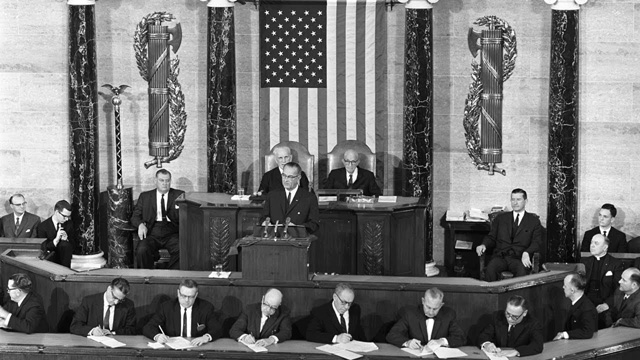
Photo: LBJ Presidential Library
“At times, history and fate meet at a single time in a single place to shape a turning point in man’s unending search for freedom. So it was at Lexington and Concord. So it was a century ago at Appomattox. So it was last week in Selma, Alabama. There, long suffering men and women peacefully protested the denial of their rights as Americans. Many of them were brutally assaulted. One good man — a man of God — was killed.”
That man, the Rev. James Reeb, a Unitarian Universalist Minister, had left his home in Boston to join King’s campaign after Bloody Sunday, only to be attacked by a Klansman who took his life. When the president mentioned Reeb’s name, there wasn’t a sound in the crowded chamber — not a cough, not a whisper, not a stir.
“There is no cause for pride in what has happened in Selma,” the president continued. “There is no cause for self-satisfaction in the long denial of equal rights of millions of Americans. But there is cause for hope and for faith in our democracy. Our mission is at once the oldest and the most basic of this country — to right wrong, to do justice, to serve man. Rarely in any time does an issue lay bare the secret heart of America itself. Rarely are we met with a challenge, not to our growth or abundance, or our welfare or our security, but rather to the values and the purposes and the meaning of our beloved nation. The issue of equal rights for American Negroes is such an issue. And should we defeat every enemy, and should we double our wealth and conquer the stars, and still be unequal to this issue, then we will have failed as a people and as a nation. For, with a country as with a person, ‘what is a man profited if he shall gain the whole world, and lose his own soul?’”
The biblical quotation produced the first applause. “You can always count on the Bible to get them going,” Goodwin later reflected. But Johnson did not smile or recognize the response in any way. When it was quiet again, he went on.
“There is no Negro problem. There is no Southern problem. There is no Northern problem. There is only an American problem.” That produced the second sustained applause of the evening.
“And we are met here tonight as Americans — not as Democrats or Republicans to solve that problem.”
Johnson reminded Congress and the country of America’s founding principles. “To deny a man his hopes because of his color or race or his religion or the place of his birth is not only to do injustice, it is to deny Americans and to dishonor the dead who gave their lives for American freedom,” he said. “Many of the issues of civil rights are very complex and most difficult. But about this there can and should be no argument: every American citizen must have an equal right to vote. There is no reason which can excuse the denial of that right. Yet the harsh fact is that in many places in this country, men and women are kept from voting simply because they are Negroes.”
Then the president became what he had once been — a teacher, explaining to his countrymen what happened when a southern black man or woman tried to register to vote. “Every device of which human ingenuity is capable has been used to deny this right. The Negro citizen may go to register only to be told that the day is wrong, or the hour is late, or the official in charge is absent. And if he persists and, if he manages to present himself to the registrar, he may be disqualified because he did not spell out his middle name, or because he abbreviated a word on the application. And if he manages to fill out an application, he is given a test. The registrar is the sole judge of whether he passes this test. He may be asked to recite the entire Constitution, or explain the most complex provisions of state law.
“And even a college degree cannot be used to prove that he can read and write. For the fact is that the only way to pass these barriers is to show a white skin. No law that we now have on the books can insure the right to vote when local officials are determined to deny it. In such a case, our duty must be clear to all of us. The Constitution says that no person shall be kept from voting because of his race or his color.”
To correct this denial of the fundamental right to vote, the president proposed a remedy. “Wednesday, I will send to Congress a law designed to eliminate illegal barriers to the right to vote. This bill will strike down restrictions to voting in all elections, federal, state and local, which have been used to deny Negroes the right to vote.
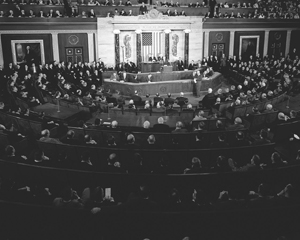
LBJ addresses Congress and America (Photo: LBJ Presidential Library/YouTube)
“On this issue, there must be no delay, or no hesitation, or no compromise with our purpose. We cannot, we must not, refuse to protect the right of every American to vote in every election that he may desire to participate in.
“And we ought not, and we cannot, and we must not wait before we get a bill. We have already waited 100 years and more and the time for waiting is gone. So I ask you to join me in working long hours and nights and weekends, if necessary, to pass this bill. And I don’t make that request lightly, for, from the window where I sit, with the problems of our country, I recognize that from outside this chamber is the outraged conscience of a nation, the grave concern of many nations and the harsh judgment of history on our acts.”
The chairman of the House Judiciary Committee, Brooklyn Democrat Emanuel Celler, leapt to his feet to lead what became a 30-second standing ovation. Senate Majority Leader Mike Mansfield, usually shy and retiring, was “shaking with emotion,” Newsweek reported, and had tears in his eyes.
But there was more, the words that would forever mark that moment as the greatest in Johnson’s presidency. “What happened in Selma is part of a far larger movement which reaches into every section and state of America. It is the effort of American Negroes to secure for themselves the full blessings of American life. Their cause must be our cause too. Because it’s not just Negroes, but really it’s all of us, who must overcome the crippling legacy of bigotry and injustice.”
He paused, and then, slowly, distinctly, the president uttered the words never before said by an American president: “And…we… shall… overcome.”
For a moment there was only stunned silence, as it dawned on all who listened that President Lyndon Johnson, a son of the South, had just evoked the anthem of the civil rights movement. Then the room erupted in applause. Almost everyone rose — save the southerners (“Goddamn,” one cursed) and Senator Dirksen. Johnson glared at Dirksen and paused until the television cameras focused on the senator, who then rose, joining the others who were giving Johnson a standing ovation.
“In the galleries, Negroes and whites wept unabashedly,” noted a presidential aide. Bill Moyers “was standing off to the right, below the president on the floor of the House,” he recalled in 2013. “I could look right into the eyes of the representatives and senators… They had never heard a president of the United States say that anywhere. And to say it… on the rostrum there in the House chamber before the assembled Congress… At first they could not believe it. Johnson created a magnificent moment.”
In Selma, Alabama, the movement’s leaders had gathered at the home of Sullivan Jackson, the city’s sole black dentist, to watch Johnson’s speech. When he uttered those three incredible words, “We shall overcome,” King’s lieutenants were shocked, then cried out, “Can you believe he said that?” John Lewis looked over at King and saw him wipe tears from his cheek.
In private, during the days before the speech, Johnson had often complained about the demonstrators’ impatience and their failure, as he saw it, to appreciate all that he done for black Americans. Tonight, however, he had only empathy and praise for these men and women. “A century has passed — more than 100 years — since the Negro was freed,” Johnson said after the applause had died down. “And he is not fully free tonight. It was more than 100 years ago that Abraham Lincoln signed the Emancipation Proclamation. But emancipation is a proclamation and not a fact. The time of justice has now come, and I tell you that I believe sincerely that no force can hold it back. It is right in the eyes of man and God that it should come, and when it does, I think that day will brighten the lives of every American.
“The real hero of this struggle,” Johnson continued, “is the American Negro. His actions and protests, his courage to risk safety, and even to risk his life, have awakened the conscience of this nation. His demonstrations have been designed to call attention to injustice, designed to provoke change, designed to stir reform. He has been called upon to make good the promise of America. And who among us can say that we would have made the same progress were it not for his persistent bravery and his faith in American democracy? For at the real heart of the battle for equality is a deep-seated belief in the democratic process. Equality depends, not on the force of arms or tear gas, but depends upon the force of moral right.”
His speech had already gone past the half-hour mark, and for all its drama, his audience was growing restless. But he had more to say. “He was more emotionally and bodily into that speech than I had seen him in months,” Moyers noted recently. In the last few minutes, Johnson took his audience back into his own past for another lesson on the evils of prejudice. He told the story he had reminded Goodwin to include earlier in the day.
Johnson was just 20 years old, he said, when his first job took him to the small, impoverished town of Cotulla, Texas, where he taught young Mexican-Americans. He smiled at the memory of it but then grew serious again. “Few of them could speak English and I couldn’t speak much Spanish. My students were poor and they often came to class without breakfast and hungry. And they knew even in their youth the pain of prejudice. They never seemed to know why people disliked them, but they knew it was so because I saw it in their eyes.
“I often walked home late in the afternoon after the classes were finished, wishing there was more that I could do. But all I knew was to teach them the little that I knew, hoping that I might help them against the hardships that lay ahead. And somehow you never forget what poverty and hatred can do when you see its scars on the hopeful face of a young child.
“I never thought then, in 1928, that I would be standing here in 1965. It never even occurred to me in my fondest dreams that I might have the chance to help the sons and daughters of those students, and to help people like them all over this country. But now I do have that chance.”
His eyes narrowed and his voice grew more determined: “I’ll let you in on a secret — I mean to use it. And I hope that you will use it with me.” He was almost finished, but he wanted all to know what kind of president he wished to be — one who educated the young, fed the hungry, helped the poor, ended hatred, “and protected the right of every citizen to vote in every election.” He asked Congress to join him in this historic task.
He departed the House chamber “a changed man,” TIME later observed, “…certain that he had launched the US itself inexorably toward a new purpose.”
As Johnson and his party returned to the White House the switchboards were jammed with calls, mostly favorable. One reached him in the upstairs sitting room. “That was Dick Russell,” he told Goodwin, Moyers and the others. Sen. Richard Russell of Georgia, Johnson’s mentor and longtime opponent of civil rights, told the president that while he had not converted him, he thought the speech “the best” ever given by an American president.
“Let’s have a little whiskey, boys,” LBJ said with a grin. “Looks like we have something to celebrate.”
It is unusual when a presidential address stands the test of time. Only a few have: Lincoln’s “mystic chords of memory;” FDR’s “fear itself;” JFK’s “…this nation, for all its hopes and all its boasts, will not be fully free until all its citizens are free.” Lyndon Johnson’s “The American Promise” belongs in that special group of historic speeches. It still speaks to an America torn by racial discord and a challenge to the right to vote for all.
President Obama is scheduled to attend the 50th anniversary commemoration of Bloody Sunday. In 1965, LBJ seized on that event to send the Voting Rights Act to the Congress and to speak to the nation. The bipartisan bill passed both houses of Congress overwhelmingly and the president signed it into law in an elaborate ceremony at Capitol Hill’s Statuary Hall on Aug. 6, 1965.
Will the 44th president emulate the 36th and rise to the occasion that “history and fate” now offer him – will he call for the swift passage of the bipartisan Voting Rights Amendment Act of 2015, which will protect everyone’s right to vote and repair the damage done in 2013 by the Supreme Court’s conservative majority? He should invite Congress to join him in righting wrong and doing justice by tackling America’s unresolved racial and political problems.



